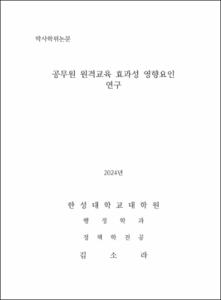공무원 원격교육 효과성 영향요인 연구
= A Study on Factors Influencing the Effectiveness of Distance Learning in Civil Servants
- Type
- Thesis
- Advisor
- 윤경준
- Department
- 대학원 행정학과
- Issued Date
- 2024
- Publisher
- 한성대학교 대학원
- Keyword
- 공무원 원격교육; 국가공무원 인재개발원 나라배움터; 자기개발; 직무능력향상; 효과성 영향요인
- Files in This Item:
-
-
Download
 200000729530.pdf
기타 데이터 / 1.29 MB / Adobe PDF
200000729530.pdf
기타 데이터 / 1.29 MB / Adobe PDF
-
Items in Repository are protected by copyright, with all rights reserved, unless otherwise indicated.